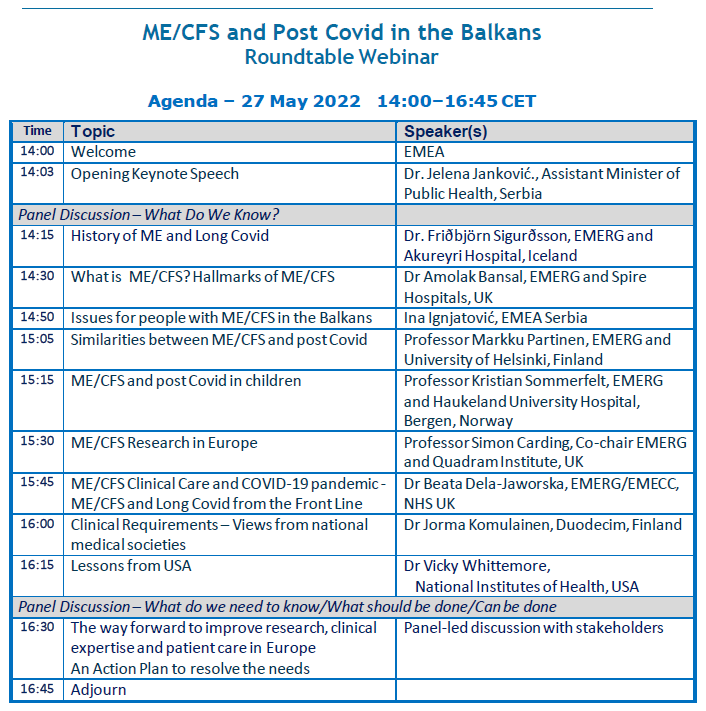Wyva
Senior Member (Voting Rights)
Edit: Countries that are included in this thread in alphabetical order:
Albania, Bosnia and Herzegovina, Bulgaria, Croatia, Cyprus, Greece, Kosovo, Moldova, Montenegro, North Macedonia, Romania, Serbia, Slovenia
I used the broadest definition of SEE here but there are overlaps with other regions and some of these are more cultural, not so much geographical groupings, so I'm open to changing the list of the countries belonging to this group if someone feels it is not appropriate.
---
There is a sizeable ethnic Hungarian minority in Serbia too who have their own news sites in Hungarian, so I can read them - I get the Google alert notifications from those too. (And the same is true for Romania and Slovakia too - the latter is of course not in SEE.)
So far I've got nothing on ME/CFS at all but even long covid is something that extremely rarely gets an article, at least in the Hungarian language media of these countries. Of course I can't really get the whole picture through this lens but at least we can get some snippets.
These are the two items about long covid from Serbia I've seen this year.
From January: A post-covid counseling program is being launched in pharmacies across Serbia
Google translate from Hungarian:
The other one is from today and is actually a very short news item I saw in Hungarian media today (so this is not from the minority media):
Post-Covid surgeries have opened in Serbia
Google translate from Hungarian:
So it looks like to me that they were quite slow to deal with long covid and also mostly see it as primarily consisting of noticeable organ damage and mental health issues like depression. (The latter part is the same in Hungary and Slovakia too.)
Albania, Bosnia and Herzegovina, Bulgaria, Croatia, Cyprus, Greece, Kosovo, Moldova, Montenegro, North Macedonia, Romania, Serbia, Slovenia
I used the broadest definition of SEE here but there are overlaps with other regions and some of these are more cultural, not so much geographical groupings, so I'm open to changing the list of the countries belonging to this group if someone feels it is not appropriate.
---
There is a sizeable ethnic Hungarian minority in Serbia too who have their own news sites in Hungarian, so I can read them - I get the Google alert notifications from those too. (And the same is true for Romania and Slovakia too - the latter is of course not in SEE.)
So far I've got nothing on ME/CFS at all but even long covid is something that extremely rarely gets an article, at least in the Hungarian language media of these countries. Of course I can't really get the whole picture through this lens but at least we can get some snippets.
These are the two items about long covid from Serbia I've seen this year.
From January: A post-covid counseling program is being launched in pharmacies across Serbia
Google translate from Hungarian:
The Serbian Chamber of Pharmacy has launched a post-covid counseling program that will be available in pharmacies across Serbia in the coming period.
Tatjana Šipetić, director of the Serbian Chamber of Pharmacy, told RTS that 80 percent of the more than 1,600,000 people infected so far may have some form of post-covid symptom and need help.
“From our environment and the literature we follow, we see that many have not even noticed that some of the symptoms are related to the coronavirus,” Šipetić said.
He claims that some have closed themselves completely because they think something terrible has happened to them and their lives have changed because they have memory problems or their hair has started to fall out.
He says the pilot project began on December 5 with an online training for pharmacists from different cities in Serbia.
“They had the opportunity to look at the underlying clinical symptoms of long-term post-covid syndrome and learn how they can approach the patient and how they can help reduce the intensity of the symptoms,” Šipetić said.
“I would never take on the role of a doctor. There are conditions that require you to see a doctor, but pharmacists will be able to make a recommendation, ”he added. (FoNet, RTS)
The other one is from today and is actually a very short news item I saw in Hungarian media today (so this is not from the minority media):
Post-Covid surgeries have opened in Serbia
Google translate from Hungarian:
Cardiovascular disease, diabetes or even depression can be a long-term consequence of coronavirus infection, and post-Covid surgeries have been set up in Serbia to treat them.
Cardiologist Petar Seferovic told Serbian public television on Monday that while the epidemic was coming to an end, the coronavirus infection also had more lasting consequences. As he said, doctors have found that the coronavirus attacks the weakest parts of the body, leading to diseases that used to be hidden and the infection accelerated their development.
So it looks like to me that they were quite slow to deal with long covid and also mostly see it as primarily consisting of noticeable organ damage and mental health issues like depression. (The latter part is the same in Hungary and Slovakia too.)
Last edited:



